Hydrocarbon Solvents Market
Hydrocarbon Solvents Market Size and Share Forecast Outlook 2025 to 2035
Hydrocarbon solvents market is projected to grow from USD 52.0 billion in 2025 to USD 78.0 billion by 2035, at a CAGR of 4.1%. Aliphatic will dominate with a 50.0% market share, while paints & coatings will lead the end use segment with a 40.0% share.
Hydrocarbon Solvents Market Forecast and Outlook 2025 to 2035
The global hydrocarbon solvents market is valued at USD 52.0 billion in 2025 and is set to reach USD 78.0 billion by 2035, recording an absolute increase of USD 26.0 billion over the forecast period. This translates into a total growth of 50.0%, with the market forecast to expand at a compound annual growth rate (CAGR) of 4.1% between 2025 and 2035.
The overall market size is expected to grow by approximately 1.5X during the same period, supported by increasing demand for industrial cleaning solutions, growing paint and coating industry, and rising applications across chemicals, industrial cleaning, and specialty solvent segments.
Quick Stats for Hydrocarbon Solvents Market
- Hydrocarbon Solvents Market Value (2025): USD 52.0 billion
- Hydrocarbon Solvents Market Forecast Value (2035): USD 78.0 billion
- Hydrocarbon Solvents Market Forecast CAGR: 4.1%
- Leading Product Category in Hydrocarbon Solvents Market: Aliphatic (50.0%)
- Key Growth Regions in Hydrocarbon Solvents Market: North America, Europe, Asia-Pacific
- Key Players in Hydrocarbon Solvents Market: ExxonMobil, Shell, Chevron, LyondellBasell, Total
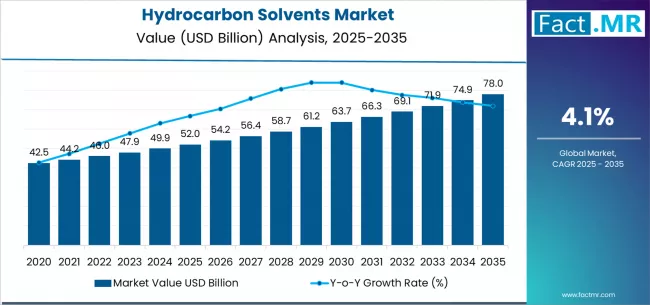
The global hydrocarbon solvents market represents a critical segment within the petrochemical solvents and industrial chemicals industry, driven by the superior dissolving profile of hydrocarbon-based products and the diverse functional properties of various solvent types. These specialized solvent products are produced through precision refining processes, providing consistent chemical standards and standardized performance characteristics for various industrial and commercial applications including paint formulation, chemical processing, and specialized cleaning operations. The processing mechanism enables controlled solvent development, making these products particularly suitable for industrial users and applications requiring specific dissolving characteristics.
The market encompasses various solvent types, processing grades, and specialized refining methods tailored for specific industrial requirements. Modern hydrocarbon solvent production incorporates advanced refining technology, molecular optimization, and enhanced processing techniques that can deliver consistent quality across variable petroleum feedstocks while maintaining chemical integrity over extended storage periods. The integration of quality control systems, safety protocols, and standardized processing parameters has further enhanced the value proposition of these solvent products among industrial manufacturers seeking reliable solvent performance and consistent chemical outcomes.
Market dynamics are significantly influenced by rising industrial activity, particularly in developed markets where manufacturing expansion and chemical processing drive demand for hydrocarbon solvent products. The industrial sector's increasing emphasis on effective solvents, specialized chemical formulations, and high-performance cleaning applications has created substantial demand for high-quality hydrocarbon solvent solutions in paint applications, chemical production, and industrial cleaning operations. Additionally, the growing trend toward specialized chemical processing and advanced manufacturing technologies has amplified the need for versatile solvent products capable of supporting diverse industrial requirements and chemical applications.
Consumer purchasing patterns show a marked preference for certified hydrocarbon solvent varieties that combine advanced refining methods with consistent performance characteristics, multiple application options, and comprehensive chemical profiles for diverse industrial applications. The market has witnessed significant technological advancement in refining efficiency design, quality control systems, and safety compliance solutions, making these products more suitable for demanding industrial environments, extended storage requirements, and performance-critical chemical operations.
Between 2025 and 2030, the hydrocarbon solvents market is projected to expand from USD 52.0 billion to USD 63.4 billion, resulting in a value increase of USD 11.4 billion, which represents 43.8% of the total forecast growth for the decade. This phase of development will be shaped by increasing industrial solvent adoption, rising demand for alternative chemical solutions, and growing availability of premium hydrocarbon solvent varieties across industrial and chemical channels.
Between 2030 and 2035, the market is forecast to grow from USD 63.4 billion to USD 78.0 billion, adding another USD 14.6 billion, which constitutes 56.2% of the overall ten-year expansion. This period is expected to be characterized by the advancement of specialty hydrocarbon solvent applications, the development of enhanced solvent products for industrial improvement, and the expansion of certified hydrocarbon solvent availability across diverse chemical and industrial segments. The growing emphasis on effective solvents and advanced chemical processing will drive demand for premium hydrocarbon solvent varieties with enhanced functional properties, improved chemical characteristics, and superior performance profiles in specialized industrial applications.
Between 2020 and 2024, the hydrocarbon solvents market experienced steady growth, driven by increasing awareness of effective solvent benefits and growing recognition of hydrocarbon solvents' effectiveness in industrial applications following extensive chemical technology campaigns. The market developed as manufacturers recognized the advantages of hydrocarbon solvents over alternative solvent products in chemical-sensitive applications and began seeking specialized products designed for specific dissolving and chemical requirements. Technological advancement in refining technology and chemical compliance began emphasizing the critical importance of maintaining chemical integrity while enhancing functional performance and improving effectiveness across diverse hydrocarbon solvent applications.
Hydrocarbon Solvents Market Key Takeaways
| Metric | Value |
|---|---|
| Estimated Value in (2025E) | USD 52.0 billion |
| Forecast Value in (2035F) | USD 78.0 billion |
| Forecast CAGR (2025 to 2035) | 4.1% |
From 2030 to 2035, the market is forecast to grow from USD 63.4 billion to USD 78.0 billion, adding another USD 14.6 billion, which constitutes 56.2% of the overall ten-year expansion. This period is expected to be characterized by the advancement of specialized processing techniques in solvent production systems, the integration of quality enhancement protocols for optimal chemical retention, and the development of customized solvent formulations for high-performance industrial applications. The growing emphasis on solvent functionality and product reliability will drive demand for premium varieties with enhanced processing capabilities, improved storage stability, and superior chemical performance characteristics.
Between 2020 and 2024, the hydrocarbon solvents market experienced robust growth, driven by increasing awareness of alternative solvent benefits and growing recognition of specialized solvent systems' effectiveness in supporting diverse industrial operations across chemical facilities and specialty manufacturing environments.
The market developed as users recognized the potential for hydrocarbon solvent products to deliver functional advantages while meeting modern requirements for effective solvents and reliable chemical performance. Technological advancement in processing optimization and quality enhancement began emphasizing the critical importance of maintaining solvent consistency while extending product stability and improving user satisfaction across diverse hydrocarbon solvent applications.
Why is the Hydrocarbon Solvents Market Growing?
Market expansion is being supported by the increasing global emphasis on effective industrial solvents and the corresponding shift toward alternative solvent systems that can provide superior dissolving characteristics while meeting industrial requirements for advanced chemical solutions and cost-effective processing options. Modern industrial manufacturers are increasingly focused on incorporating solvent products that can enhance chemical performance while satisfying demands for consistent, precisely controlled dissolving development and optimized chemical profiles. Hydrocarbon solvents' proven ability to deliver chemical excellence, functional versatility, and diverse application possibilities makes them essential chemicals for industrial-focused professionals and quality-focused chemical manufacturers.
The growing emphasis on effective solvents and advanced chemical processing is driving demand for high-performance hydrocarbon solvent systems that can support distinctive industrial outcomes and comprehensive chemical benefits across paint applications, chemical production, and specialty industrial manufacturing. Industrial preference for solvent solutions that combine functional excellence with advanced processing methods is creating opportunities for innovative implementations in both traditional and emerging chemical applications. The rising influence of industrial expansion and alternative chemical approaches is also contributing to increased adoption of hydrocarbon solvent solutions that can provide authentic functional benefits and reliable dissolving characteristics.
Segmental Analysis
The market is segmented by type, end use, and region. By type, the market is divided into aliphatic, aromatic, and naphthenic solvents. Based on end use, the market is categorized into paints & coatings, chemicals, and industrial cleaning. Regionally, the market is divided into North America, Europe, and Asia-Pacific.
Why are Aliphatic Hydrocarbon Solvents Preferred over Other Types?
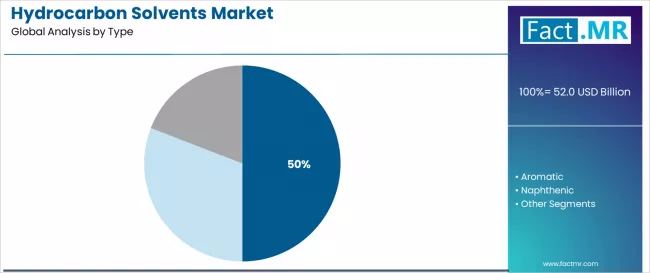
The aliphatic segment is projected to account for 50.0% of the hydrocarbon solvents market in 2025, reaffirming its position as the leading solvent category. Industrial manufacturers and chemical professionals increasingly utilize aliphatic solvents for their superior safety characteristics, established dissolving properties, and essential functionality in diverse industrial applications across multiple chemical sectors. Aliphatic solvent's proven performance characteristics and established cost-effectiveness directly address user requirements for reliable dissolving control and optimal processing precision in paint and specialty chemical applications.
This solvent segment forms the foundation of modern industrial chemical patterns, as it represents the hydrocarbon solvent type with the greatest chemical versatility and established compatibility across multiple industrial systems. Chemical industry investments in alternative solvent technology and industrial optimization continue to strengthen adoption among safety-focused manufacturers. With processors prioritizing solvent reliability and functional consistency, aliphatic systems align with both performance objectives and safety requirements, making them the central component of comprehensive industrial chemical strategies.
Which End Use Category Makes Maximum Use of Hydrocarbon Solvents?
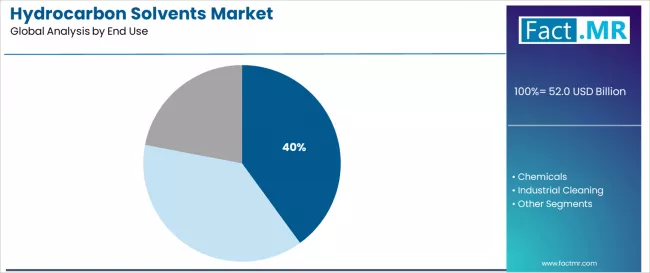
Paints & coatings are to represent 40.0% all hydrocarbon solvents usage in 2025, underscoring its important role as a key application for performance-focused users seeking superior dissolving and enhanced chemical credentials. Industrial facilities and manufacturing operations prefer paint & coating applications for their established performance characteristics, proven dissolving development, and ability to maintain exceptional chemical precision while supporting versatile application coverage during diverse industrial activities. Positioned as essential applications for quality-focused chemical processors, paint & coating offerings provide both functional excellence and industrial optimization advantages.
The segment is supported by continuous improvement in paint technology and the widespread availability of established performance standards that enable quality assurance and premium positioning at the industrial level. Additionally, industrial facilities are optimizing solvent selections to support application-specific requirements and comprehensive chemical strategies. As paint technology continues to advance and facilities seek consistent solvent performance, paint & coating applications will continue to drive market growth while supporting operational efficiency and quality optimization strategies.
What are the Drivers, Restraints, and Key Trends of the Hydrocarbon Solvents Market?
The hydrocarbon solvents market is advancing rapidly due to increasing industrial solvent adoption and growing need for alternative chemical solutions that emphasize superior dissolving performance across industrial segments and specialty chemical applications.
The market faces challenges, including competition from other alternative solvent types, price volatility in raw petroleum materials, and processing complexity considerations affecting production costs. Innovation in refining technology enhancement and specialized solvent formulations continues to influence market development and expansion patterns.
Expansion of Industrial and Chemical Applications
The growing adoption of hydrocarbon solvents with industrial certification and chemical positioning is enabling industrial companies to develop chemical products that provide distinctive dissolving benefits while commanding premium pricing and enhanced consumer appeal characteristics.
Industrial applications provide superior market positioning while allowing more sophisticated product differentiation features across various chemical categories. Industrial companies are increasingly recognizing the market advantages of effective solvent positioning for comprehensive chemical outcomes and premium-focused industrial marketing.
Integration of Safety and Performance Enhancement Systems
Modern hydrocarbon solvent manufacturers are incorporating advanced safety enhancement, performance improvement capabilities, and chemical supplementation systems to enhance product functionality, improve industrial effectiveness, and meet consumer demands for enhanced chemical solutions.
These systems improve product performance while enabling new applications, including specialty industrial programs and specialized chemical protocols. Advanced performance integration also allows manufacturers to support premium product positioning and chemical assurance beyond traditional solvent performance requirements.
Analysis of the Hydrocarbon Solvents Market by Key Country
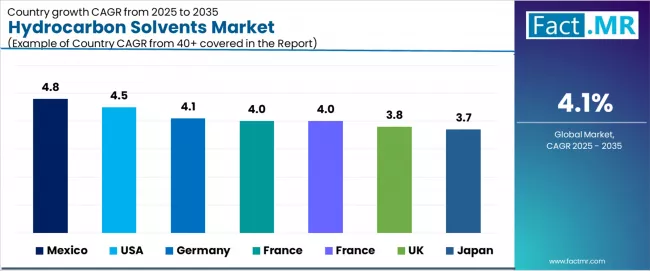
| Country | CAGR (2025-2035) |
|---|---|
| USA | 4.5% |
| UK | 3.8% |
| Germany | 4.1% |
| France | 4.0% |
| Japan | 3.7% |
| South Korea | 4.0% |
| Mexico | 4.8% |
The hydrocarbon solvents market is experiencing robust growth globally, with USA leading at a 4.5% CAGR through 2035, driven by the expanding chemical manufacturing sector, growing industrial activity, and increasing adoption of hydrocarbon solvent products. Mexico follows at 4.8%, supported by rising chemical manufacturing capabilities, expanding industrial sector, and growing acceptance of solvent products.
Germany shows growth at 4.1%, emphasizing established chemical standards and comprehensive solvent development. France records 4.0%, focusing on chemical industry modernization and industrial market growth. South Korea demonstrates 4.0% growth, prioritizing advanced chemical technologies and effectiveness-focused industrial products.
The report covers an in-depth analysis of 40+ countries; seven top-performing countries are highlighted below.
USA Leads Global Market Growth with Chemical Expansion
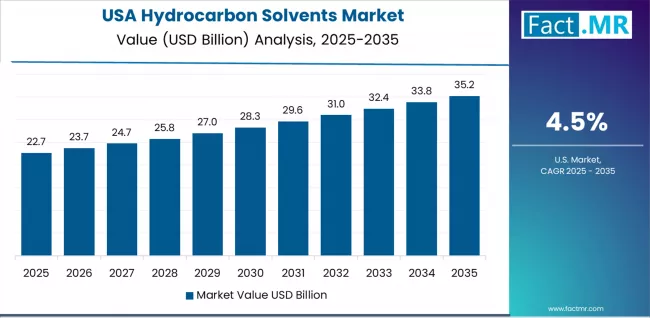
Revenue from hydrocarbon solvent consumption and sales in USA is projected to exhibit exceptional growth with a CAGR of 4.5% through 2035, driven by the country's rapidly expanding chemical manufacturing sector, favorable industrial policies toward effective solvents, and initiatives promoting solvent development across major chemical regions.
USA's position as a global chemical leader and increasing focus on processed industrial solvents are creating substantial demand for high-quality hydrocarbon solvents in both domestic and international markets. Major chemical companies and solvent distributors are establishing comprehensive solvent production capabilities to serve growing demand and emerging industrial opportunities.
- Established chemical culture and expanding industrial consciousness are driving demand for hydrocarbon solvents across chemical facilities, industrial-oriented companies, and comprehensive solvent supply systems throughout American chemical markets.
- Strong chemical infrastructure and technology adoption initiatives are supporting the rapid adoption of premium solvent varieties among industrial-focused processors seeking to meet evolving performance standards and quality requirements.
Mexico Demonstrates Strong Market Potential with Industrial Focus
Revenue from hydrocarbon solvent products in Mexico is expanding at a CAGR of 4.8%, supported by rising domestic chemical consumption, growing processing technology adoption, and expanding solvent distributor capabilities.
The country's developing chemical infrastructure and increasing investment in processing technologies are driving demand for hydrocarbon solvents across both traditional and modern industrial applications. International solvent companies and domestic processors are establishing comprehensive operational networks to address growing market demand for alternative solvent products and efficient processing solutions.
- Rising chemical development and expanding processing capabilities are creating opportunities for solvent adoption across industrial chemical projects, modern processing developments, and distributor companies throughout major Mexican chemical regions.
- Growing industrial awareness initiatives and chemical technology advancement are driving the adoption of specialized solvent products and services among chemical users seeking to enhance their processing efficiency and meet increasing quality demand.
Germany Maintains Market Leadership with Processing Excellence
Revenue from hydrocarbon solvent products in Germany is projected to grow at a CAGR of 4.1% through 2035, supported by the country's mature chemical processing standards, established industrial solvent regulations, and leadership in specialty solvent technology.
Germany's sophisticated chemical standards and strong support for alternative solvent systems are creating steady demand for both traditional and innovative solvent varieties. Leading solvent manufacturers and specialty distributors are establishing comprehensive operational strategies to serve both domestic markets and growing export opportunities.
- Advanced processing technology capabilities and established chemical-focused markets are driving demand for premium solvents across chemical facilities, specialty companies, and comprehensive solvent companies seeking superior quality profiles and processing innovation.
- Strong quality excellence culture and regulatory leadership are supporting the adoption of innovative solvent technology among users prioritizing processing reliability and solvent precision in chemical applications.
France Strengthens Position with Chemical Industry Growth
Revenue from hydrocarbon solvent products in France is projected to grow at a CAGR of 4.0% through 2035, driven by the country's emphasis on chemical industry development, solvent processing growth, and growing distributor capabilities.
French manufacturers and processing facilities consistently seek quality-focused solvents that enhance product performance and support processing excellence for both traditional and modern chemical applications. The country's position as a European chemical leader continues to drive innovation in specialized solvent applications and chemical processing standards.
- Expanding chemical culture and growing industrial markets are driving demand for industrial solvents across processors, solvent providers, and quality-focused distributors seeking superior processing control and distinctive performance profiles.
- Increasing focus on chemical processing efficiency and industrial modernization systems is supporting the adoption of specialty solvent varieties among users and distributors seeking authentic French processing-focused products in regional markets with established chemical expertise.
South Korea Maintains Innovation Leadership
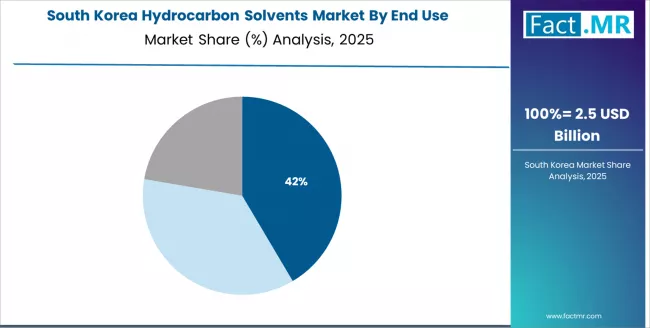
Revenue from hydrocarbon solvent products in South Korea is projected to grow at a CAGR of 4.0% through 2035, supported by established chemical standards, mature industrial markets, and emphasis on effective alternatives across chemical and industrial sectors.
South Korean manufacturers and specialty processors prioritize quality solvents and consistent performance, creating steady demand for premium solvent solutions. The country's comprehensive market innovation and established chemical practices support continued development in specialized applications.
- Established chemical markets and mature specialty industry are driving demand for quality solvents across operations, facilities, and professional processing companies throughout Korean chemical regions.
- Strong emphasis on quality standards and industrial awareness is supporting the adoption of premium solvent varieties among users seeking proven performance and established chemical credentials in specialty applications.
UK Maintains Steady Growth with Chemical Product Focus
Revenue from hydrocarbon solvent products in the UK is projected to grow at a CAGR of 3.8% through 2035, supported by established chemical standards, mature industrial markets, and emphasis on effective alternatives across chemical and manufacturing sectors.
British manufacturers and specialty processors prioritize quality solvents and consistent performance, creating steady demand for premium solvent solutions. The country's comprehensive market maturity and established chemical practices support continued development in specialized applications.
- Established chemical markets and mature specialty industry are driving demand for quality solvents across chemical operations, industrial facilities, and professional processing companies throughout British chemical regions.
- Strong emphasis on quality standards and industrial awareness is supporting the adoption of premium solvent varieties among users seeking proven performance and established chemical credentials in specialty applications.
Japan Demonstrates Quality-Focused Growth
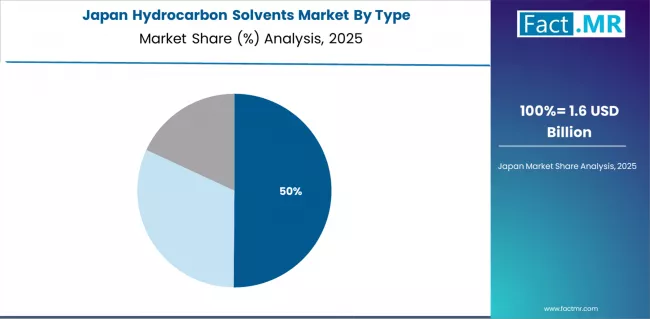
Revenue from hydrocarbon solvent products in Japan is projected to grow at a CAGR of 3.7% through 2035, supported by the country's emphasis on solvent quality, chemical excellence, and advanced processing technology integration requiring efficient solvent solutions.
Japanese chemical facilities and quality-focused operations prioritize technical performance and chemical precision, making specialized solvents essential chemicals for both traditional and modern chemical applications. The country's comprehensive chemical leadership and advancing quality patterns support continued market expansion.
- Advanced chemical technology capabilities and growing technical applications are driving demand for solvents across specialty chemical applications, modern formats, and technology-integrated processing programs serving domestic markets with increasing quality requirements.
- Strong focus on chemical precision and solvent excellence is encouraging users and distributors to adopt solvent solutions that support chemical objectives and meet Japanese quality standards for processing applications.
Europe Market Split by Country
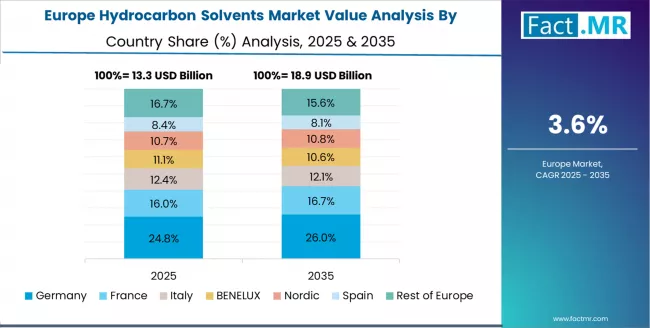
The Europe hydrocarbon solvents market is projected to grow from USD 15.6 billion in 2025 to USD 23.4 billion by 2035, registering a CAGR of 4.1% over the forecast period. Germany is expected to maintain its leadership position with a 30.0% market share in 2025, declining slightly to 29.5% by 2035, supported by its advanced chemical infrastructure and major industrial hubs including Frankfurt and Munich.
France follows with a 22.0% share in 2025, projected to reach 22.5% by 2035, driven by comprehensive chemical modernization programs and industrial solvent initiatives. The UK holds a 20.0% share in 2025, expected to decrease to 19.5% by 2035 due to market maturation. Italy commands a 18.0% share, while Spain accounts for 10.0% in 2025.
The rest of Europe region is anticipated to gain momentum, expanding its collective share from 0.0% to 0.5% by 2035, attributed to increasing solvent adoption in Nordic countries and emerging Eastern European markets implementing chemical technology programs.
Competitive Landscape of the Hydrocarbon Solvents Market
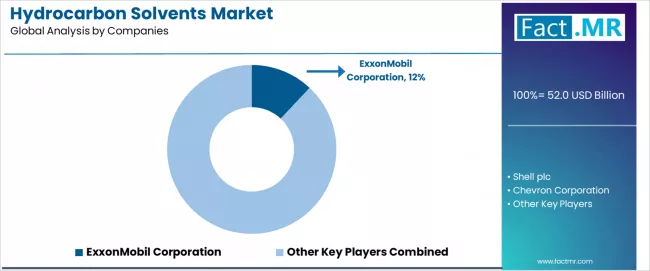
The hydrocarbon solvents market is characterized by competition among established petrochemical manufacturers, specialized solvent companies, and integrated chemical processing providers.
Companies are investing in advanced refining technologies, specialized processing engineering, product innovation capabilities, and comprehensive distribution networks to deliver consistent, high-quality, and reliable hydrocarbon solvent products.
Innovation in refining efficiency optimization, quality control advancement, and safety-focused product development is central to strengthening market position and customer satisfaction.
ExxonMobil Corporation leads the market with 12.0% share with a strong focus on petrochemical technology innovation and comprehensive chemical solutions, offering industrial and specialty systems with emphasis on quality excellence and safety heritage. Shell provides integrated advanced chemical solutions with a focus on industrial market applications and functional solvent networks.
Chevron delivers comprehensive petrochemical products with a focus on industrial positioning and chemical quality. LyondellBasell specializes in chemical-based solvent systems with an emphasis on industrial applications. Total focuses on comprehensive chemical processing with advanced refining technology and industrial positioning capabilities.
Key Players in the Hydrocarbon Solvents Market
- ExxonMobil Corporation
- Shell plc
- Chevron Corporation
- LyondellBasell Industries N.V.
- TotalEnergies SE
- BASF SE
- Dow Inc.
- Sasol Limited
- PKN Orlen S.A.
- Repsol S.A.
- Valero Energy Corporation
Scope of the Report
| Items | Values |
|---|---|
| Quantitative Units (2025) | USD 52.0 Billion |
| Type | Aliphatic, Aromatic, Naphthenic |
| End Use | Paints & Coatings, Chemicals, Industrial Cleaning |
| Regions Covered | North America, Europe, Asia-Pacific |
| Countries Covered | USA, UK, Germany, France, Japan, South Korea, Mexico, and 40+ countries |
| Key Companies Profiled | ExxonMobil, Shell, Chevron, LyondellBasell, Total, and other leading hydrocarbon solvent companies |
| Additional Attributes | Dollar sales by type, end use, and region; regional demand trends, competitive landscape, technological advancements in solvent processing, quality optimization initiatives, safety enhancement programs, and premium product development strategies |
Hydrocarbon Solvents Market by Segments
-
Type :
- Aliphatic
- Aromatic
- Naphthenic
-
End Use :
- Paints & Coatings
- Chemicals
- Industrial Cleaning
-
Region :
- North America
- USA
- Canada
- Mexico
- Europe
- Germany
- UK
- France
- Italy
- Spain
- Rest of Europe
- Asia-Pacific
- China
- India
- Japan
- South Korea
- Australia
- Rest of Asia Pacific
- North America
Table of Content
- Executive Summary
- Global Market Outlook
- Demand to side Trends
- Supply to side Trends
- Technology Roadmap Analysis
- Analysis and Recommendations
- Market Overview
- Market Coverage / Taxonomy
- Market Definition / Scope / Limitations
- Market Background
- Market Dynamics
- Drivers
- Restraints
- Opportunity
- Trends
- Scenario Forecast
- Demand in Optimistic Scenario
- Demand in Likely Scenario
- Demand in Conservative Scenario
- Opportunity Map Analysis
- Product Life Cycle Analysis
- Supply Chain Analysis
- Investment Feasibility Matrix
- Value Chain Analysis
- PESTLE and Porter’s Analysis
- Regulatory Landscape
- Regional Parent Market Outlook
- Production and Consumption Statistics
- Import and Export Statistics
- Market Dynamics
- Global Market Analysis 2020 to 2024 and Forecast, 2025 to 2035
- Historical Market Size Value (USD Million) Analysis, 2020 to 2024
- Current and Future Market Size Value (USD Million) Projections, 2025 to 2035
- Y to o to Y Growth Trend Analysis
- Absolute $ Opportunity Analysis
- Global Market Pricing Analysis 2020 to 2024 and Forecast 2025 to 2035
- Global Market Analysis 2020 to 2024 and Forecast 2025 to 2035, By Type
- Introduction / Key Findings
- Historical Market Size Value (USD Million) Analysis By Type , 2020 to 2024
- Current and Future Market Size Value (USD Million) Analysis and Forecast By Type , 2025 to 2035
- Aliphatic
- Aromatic
- Naphthenic
- Y to o to Y Growth Trend Analysis By Type , 2020 to 2024
- Absolute $ Opportunity Analysis By Type , 2025 to 2035
- Global Market Analysis 2020 to 2024 and Forecast 2025 to 2035, By End Use
- Introduction / Key Findings
- Historical Market Size Value (USD Million) Analysis By End Use, 2020 to 2024
- Current and Future Market Size Value (USD Million) Analysis and Forecast By End Use, 2025 to 2035
- Paints & Coatings
- Chemicals
- Industrial Cleaning
- Y to o to Y Growth Trend Analysis By End Use, 2020 to 2024
- Absolute $ Opportunity Analysis By End Use, 2025 to 2035
- Global Market Analysis 2020 to 2024 and Forecast 2025 to 2035, By Region
- Introduction
- Historical Market Size Value (USD Million) Analysis By Region, 2020 to 2024
- Current Market Size Value (USD Million) Analysis and Forecast By Region, 2025 to 2035
- North America
- Latin America
- Western Europe
- Eastern Europe
- East Asia
- South Asia and Pacific
- Middle East & Africa
- Market Attractiveness Analysis By Region
- North America Market Analysis 2020 to 2024 and Forecast 2025 to 2035, By Country
- Historical Market Size Value (USD Million) Trend Analysis By Market Taxonomy, 2020 to 2024
- Market Size Value (USD Million) Forecast By Market Taxonomy, 2025 to 2035
- By Country
- USA
- Canada
- Mexico
- By Type
- By End Use
- By Country
- Market Attractiveness Analysis
- By Country
- By Type
- By End Use
- Key Takeaways
- Latin America Market Analysis 2020 to 2024 and Forecast 2025 to 2035, By Country
- Historical Market Size Value (USD Million) Trend Analysis By Market Taxonomy, 2020 to 2024
- Market Size Value (USD Million) Forecast By Market Taxonomy, 2025 to 2035
- By Country
- Brazil
- Chile
- Rest of Latin America
- By Type
- By End Use
- By Country
- Market Attractiveness Analysis
- By Country
- By Type
- By End Use
- Key Takeaways
- Western Europe Market Analysis 2020 to 2024 and Forecast 2025 to 2035, By Country
- Historical Market Size Value (USD Million) Trend Analysis By Market Taxonomy, 2020 to 2024
- Market Size Value (USD Million) Forecast By Market Taxonomy, 2025 to 2035
- By Country
- Germany
- UK
- Italy
- Spain
- France
- Nordic
- BENELUX
- Rest of Western Europe
- By Type
- By End Use
- By Country
- Market Attractiveness Analysis
- By Country
- By Type
- By End Use
- Key Takeaways
- Eastern Europe Market Analysis 2020 to 2024 and Forecast 2025 to 2035, By Country
- Historical Market Size Value (USD Million) Trend Analysis By Market Taxonomy, 2020 to 2024
- Market Size Value (USD Million) Forecast By Market Taxonomy, 2025 to 2035
- By Country
- Russia
- Poland
- Hungary
- Balkan & Baltic
- Rest of Eastern Europe
- By Type
- By End Use
- By Country
- Market Attractiveness Analysis
- By Country
- By Type
- By End Use
- Key Takeaways
- East Asia Market Analysis 2020 to 2024 and Forecast 2025 to 2035, By Country
- Historical Market Size Value (USD Million) Trend Analysis By Market Taxonomy, 2020 to 2024
- Market Size Value (USD Million) Forecast By Market Taxonomy, 2025 to 2035
- By Country
- China
- Japan
- South Korea
- By Type
- By End Use
- By Country
- Market Attractiveness Analysis
- By Country
- By Type
- By End Use
- Key Takeaways
- South Asia and Pacific Market Analysis 2020 to 2024 and Forecast 2025 to 2035, By Country
- Historical Market Size Value (USD Million) Trend Analysis By Market Taxonomy, 2020 to 2024
- Market Size Value (USD Million) Forecast By Market Taxonomy, 2025 to 2035
- By Country
- India
- ASEAN
- Australia & New Zealand
- Rest of South Asia and Pacific
- By Type
- By End Use
- By Country
- Market Attractiveness Analysis
- By Country
- By Type
- By End Use
- Key Takeaways
- Middle East & Africa Market Analysis 2020 to 2024 and Forecast 2025 to 2035, By Country
- Historical Market Size Value (USD Million) Trend Analysis By Market Taxonomy, 2020 to 2024
- Market Size Value (USD Million) Forecast By Market Taxonomy, 2025 to 2035
- By Country
- Kingdom of Saudi Arabia
- Other GCC Countries
- Turkiye
- South Africa
- Other African Union
- Rest of Middle East & Africa
- By Type
- By End Use
- By Country
- Market Attractiveness Analysis
- By Country
- By Type
- By End Use
- Key Takeaways
- Key Countries Market Analysis
- USA
- Pricing Analysis
- Market Share Analysis, 2024
- By Type
- By End Use
- Canada
- Pricing Analysis
- Market Share Analysis, 2024
- By Type
- By End Use
- Mexico
- Pricing Analysis
- Market Share Analysis, 2024
- By Type
- By End Use
- Brazil
- Pricing Analysis
- Market Share Analysis, 2024
- By Type
- By End Use
- Chile
- Pricing Analysis
- Market Share Analysis, 2024
- By Type
- By End Use
- Germany
- Pricing Analysis
- Market Share Analysis, 2024
- By Type
- By End Use
- UK
- Pricing Analysis
- Market Share Analysis, 2024
- By Type
- By End Use
- Italy
- Pricing Analysis
- Market Share Analysis, 2024
- By Type
- By End Use
- Spain
- Pricing Analysis
- Market Share Analysis, 2024
- By Type
- By End Use
- France
- Pricing Analysis
- Market Share Analysis, 2024
- By Type
- By End Use
- India
- Pricing Analysis
- Market Share Analysis, 2024
- By Type
- By End Use
- ASEAN
- Pricing Analysis
- Market Share Analysis, 2024
- By Type
- By End Use
- Australia & New Zealand
- Pricing Analysis
- Market Share Analysis, 2024
- By Type
- By End Use
- China
- Pricing Analysis
- Market Share Analysis, 2024
- By Type
- By End Use
- Japan
- Pricing Analysis
- Market Share Analysis, 2024
- By Type
- By End Use
- South Korea
- Pricing Analysis
- Market Share Analysis, 2024
- By Type
- By End Use
- Russia
- Pricing Analysis
- Market Share Analysis, 2024
- By Type
- By End Use
- Poland
- Pricing Analysis
- Market Share Analysis, 2024
- By Type
- By End Use
- Hungary
- Pricing Analysis
- Market Share Analysis, 2024
- By Type
- By End Use
- Kingdom of Saudi Arabia
- Pricing Analysis
- Market Share Analysis, 2024
- By Type
- By End Use
- Turkiye
- Pricing Analysis
- Market Share Analysis, 2024
- By Type
- By End Use
- South Africa
- Pricing Analysis
- Market Share Analysis, 2024
- By Type
- By End Use
- USA
- Market Structure Analysis
- Competition Dashboard
- Competition Benchmarking
- Market Share Analysis of Top Players
- By Regional
- By Type
- By End Use
- Competition Analysis
- Competition Deep Dive
- ExxonMobil Corporation
- Overview
- Product Portfolio
- Profitability by Market Segments (Product/Age /Sales Channel/Region)
- Sales Footprint
- Strategy Overview
- Marketing Strategy
- Product Strategy
- Channel Strategy
- Shell plc
- Chevron Corporation
- LyondellBasell Industries N.V.
- TotalEnergies SE
- BASF SE
- Dow Inc.
- Sasol Limited
- PKN Orlen S.A.
- Repsol S.A.
- Valero Energy Corporation
- ExxonMobil Corporation
- Competition Deep Dive
- Assumptions & Acronyms Used
- Research Methodology
List Of Table
- Table 1: Global Market Value (USD Million) Forecast by Region, 2020 to 2035
- Table 2: Global Market Value (USD Million) Forecast by Type , 2020 to 2035
- Table 3: Global Market Value (USD Million) Forecast by End Use, 2020 to 2035
- Table 4: North America Market Value (USD Million) Forecast by Country, 2020 to 2035
- Table 5: North America Market Value (USD Million) Forecast by Type , 2020 to 2035
- Table 6: North America Market Value (USD Million) Forecast by End Use, 2020 to 2035
- Table 7: Latin America Market Value (USD Million) Forecast by Country, 2020 to 2035
- Table 8: Latin America Market Value (USD Million) Forecast by Type , 2020 to 2035
- Table 9: Latin America Market Value (USD Million) Forecast by End Use, 2020 to 2035
- Table 10: Western Europe Market Value (USD Million) Forecast by Country, 2020 to 2035
- Table 11: Western Europe Market Value (USD Million) Forecast by Type , 2020 to 2035
- Table 12: Western Europe Market Value (USD Million) Forecast by End Use, 2020 to 2035
- Table 13: Eastern Europe Market Value (USD Million) Forecast by Country, 2020 to 2035
- Table 14: Eastern Europe Market Value (USD Million) Forecast by Type , 2020 to 2035
- Table 15: Eastern Europe Market Value (USD Million) Forecast by End Use, 2020 to 2035
- Table 16: East Asia Market Value (USD Million) Forecast by Country, 2020 to 2035
- Table 17: East Asia Market Value (USD Million) Forecast by Type , 2020 to 2035
- Table 18: East Asia Market Value (USD Million) Forecast by End Use, 2020 to 2035
- Table 19: South Asia and Pacific Market Value (USD Million) Forecast by Country, 2020 to 2035
- Table 20: South Asia and Pacific Market Value (USD Million) Forecast by Type , 2020 to 2035
- Table 21: South Asia and Pacific Market Value (USD Million) Forecast by End Use, 2020 to 2035
- Table 22: Middle East & Africa Market Value (USD Million) Forecast by Country, 2020 to 2035
- Table 23: Middle East & Africa Market Value (USD Million) Forecast by Type , 2020 to 2035
- Table 24: Middle East & Africa Market Value (USD Million) Forecast by End Use, 2020 to 2035
List Of Figures
- Figure 1: Global Market Pricing Analysis
- Figure 2: Global Market Value (USD Million) Forecast 2020-2035
- Figure 3: Global Market Value Share and BPS Analysis by Type , 2025 and 2035
- Figure 4: Global Market Y to o to Y Growth Comparison by Type , 2025-2035
- Figure 5: Global Market Attractiveness Analysis by Type
- Figure 6: Global Market Value Share and BPS Analysis by End Use, 2025 and 2035
- Figure 7: Global Market Y to o to Y Growth Comparison by End Use, 2025-2035
- Figure 8: Global Market Attractiveness Analysis by End Use
- Figure 9: Global Market Value (USD Million) Share and BPS Analysis by Region, 2025 and 2035
- Figure 10: Global Market Y to o to Y Growth Comparison by Region, 2025-2035
- Figure 11: Global Market Attractiveness Analysis by Region
- Figure 12: North America Market Incremental Dollar Opportunity, 2025-2035
- Figure 13: Latin America Market Incremental Dollar Opportunity, 2025-2035
- Figure 14: Western Europe Market Incremental Dollar Opportunity, 2025-2035
- Figure 15: Eastern Europe Market Incremental Dollar Opportunity, 2025-2035
- Figure 16: East Asia Market Incremental Dollar Opportunity, 2025-2035
- Figure 17: South Asia and Pacific Market Incremental Dollar Opportunity, 2025-2035
- Figure 18: Middle East & Africa Market Incremental Dollar Opportunity, 2025-2035
- Figure 19: North America Market Value Share and BPS Analysis by Country, 2025 and 2035
- Figure 20: North America Market Value Share and BPS Analysis by Type , 2025 and 2035
- Figure 21: North America Market Y to o to Y Growth Comparison by Type , 2025-2035
- Figure 22: North America Market Attractiveness Analysis by Type
- Figure 23: North America Market Value Share and BPS Analysis by End Use, 2025 and 2035
- Figure 24: North America Market Y to o to Y Growth Comparison by End Use, 2025-2035
- Figure 25: North America Market Attractiveness Analysis by End Use
- Figure 26: Latin America Market Value Share and BPS Analysis by Country, 2025 and 2035
- Figure 27: Latin America Market Value Share and BPS Analysis by Type , 2025 and 2035
- Figure 28: Latin America Market Y to o to Y Growth Comparison by Type , 2025-2035
- Figure 29: Latin America Market Attractiveness Analysis by Type
- Figure 30: Latin America Market Value Share and BPS Analysis by End Use, 2025 and 2035
- Figure 31: Latin America Market Y to o to Y Growth Comparison by End Use, 2025-2035
- Figure 32: Latin America Market Attractiveness Analysis by End Use
- Figure 33: Western Europe Market Value Share and BPS Analysis by Country, 2025 and 2035
- Figure 34: Western Europe Market Value Share and BPS Analysis by Type , 2025 and 2035
- Figure 35: Western Europe Market Y to o to Y Growth Comparison by Type , 2025-2035
- Figure 36: Western Europe Market Attractiveness Analysis by Type
- Figure 37: Western Europe Market Value Share and BPS Analysis by End Use, 2025 and 2035
- Figure 38: Western Europe Market Y to o to Y Growth Comparison by End Use, 2025-2035
- Figure 39: Western Europe Market Attractiveness Analysis by End Use
- Figure 40: Eastern Europe Market Value Share and BPS Analysis by Country, 2025 and 2035
- Figure 41: Eastern Europe Market Value Share and BPS Analysis by Type , 2025 and 2035
- Figure 42: Eastern Europe Market Y to o to Y Growth Comparison by Type , 2025-2035
- Figure 43: Eastern Europe Market Attractiveness Analysis by Type
- Figure 44: Eastern Europe Market Value Share and BPS Analysis by End Use, 2025 and 2035
- Figure 45: Eastern Europe Market Y to o to Y Growth Comparison by End Use, 2025-2035
- Figure 46: Eastern Europe Market Attractiveness Analysis by End Use
- Figure 47: East Asia Market Value Share and BPS Analysis by Country, 2025 and 2035
- Figure 48: East Asia Market Value Share and BPS Analysis by Type , 2025 and 2035
- Figure 49: East Asia Market Y to o to Y Growth Comparison by Type , 2025-2035
- Figure 50: East Asia Market Attractiveness Analysis by Type
- Figure 51: East Asia Market Value Share and BPS Analysis by End Use, 2025 and 2035
- Figure 52: East Asia Market Y to o to Y Growth Comparison by End Use, 2025-2035
- Figure 53: East Asia Market Attractiveness Analysis by End Use
- Figure 54: South Asia and Pacific Market Value Share and BPS Analysis by Country, 2025 and 2035
- Figure 55: South Asia and Pacific Market Value Share and BPS Analysis by Type , 2025 and 2035
- Figure 56: South Asia and Pacific Market Y to o to Y Growth Comparison by Type , 2025-2035
- Figure 57: South Asia and Pacific Market Attractiveness Analysis by Type
- Figure 58: South Asia and Pacific Market Value Share and BPS Analysis by End Use, 2025 and 2035
- Figure 59: South Asia and Pacific Market Y to o to Y Growth Comparison by End Use, 2025-2035
- Figure 60: South Asia and Pacific Market Attractiveness Analysis by End Use
- Figure 61: Middle East & Africa Market Value Share and BPS Analysis by Country, 2025 and 2035
- Figure 62: Middle East & Africa Market Value Share and BPS Analysis by Type , 2025 and 2035
- Figure 63: Middle East & Africa Market Y to o to Y Growth Comparison by Type , 2025-2035
- Figure 64: Middle East & Africa Market Attractiveness Analysis by Type
- Figure 65: Middle East & Africa Market Value Share and BPS Analysis by End Use, 2025 and 2035
- Figure 66: Middle East & Africa Market Y to o to Y Growth Comparison by End Use, 2025-2035
- Figure 67: Middle East & Africa Market Attractiveness Analysis by End Use
- Figure 68: Global Market - Tier Structure Analysis
- Figure 69: Global Market - Company Share Analysis
- FAQs -
How big is the hydrocarbon solvents market in 2025?
The global hydrocarbon solvents market is estimated to be valued at USD 52.0 billion in 2025.
What will be the size of hydrocarbon solvents market in 2035?
The market size for the hydrocarbon solvents market is projected to reach USD 78.0 billion by 2035.
How much will be the hydrocarbon solvents market growth between 2025 and 2035?
The hydrocarbon solvents market is expected to grow at a 4.1% CAGR between 2025 and 2035.
What are the key product types in the hydrocarbon solvents market?
The key product types in hydrocarbon solvents market are aliphatic, aromatic and naphthenic.
Which end use segment to contribute significant share in the hydrocarbon solvents market in 2025?
In terms of end use, paints & coatings segment to command 40.0% share in the hydrocarbon solvents market in 2025.